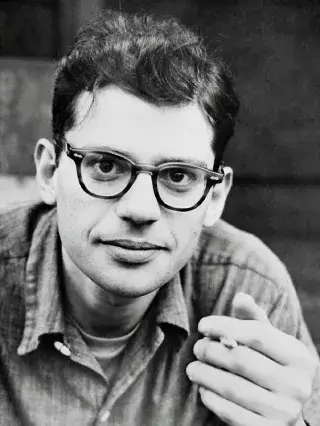Biography of Allen Ginsberg

| date | place | |
|---|---|---|
| born | June 03, 1926 | Newark, New Jersey |
| died | April 05, 1997 | New York |
Allen Ginsberg was an American poet and one of the leading figures of both the Beat Generation of the 1950s and the counterculture that followed. He vigorously opposed militarism, economic materialism, and sexual repression. Ginsberg is best known for his poem "Howl," in which he denounced what he saw as the destructive forces of capitalism and conformity in the United States. Born in Newark, New Jersey, to a Jewish family, Ginsberg's early life was marked by his mother's psychological troubles, including a series of nervous breakdowns. His experiences with his mother's mental illness and his own emerging questioning of his identity, including his sexuality, influenced his later work significantly. Ginsberg began attending Columbia University in the 1940s, where he befriended William S. Burroughs, Jack Kerouac, and others who would become central figures in the Beat Movement. Although he initially adhered to the strict formalism of his early literary education, Ginsberg's encounters with a diverse range of cultural and literary influences led him to develop a highly spontaneous, personal style of verse closely associated with the rhythms and phrasings of jazz music and the stream-of-consciousness technique. His groundbreaking poem "Howl" was published in 1956 by City Lights Books and immediately became a subject of a highly publicized obscenity trial. The poem's raw, explicit language and themes were unprecedented at the time, leading to a legal battle that concluded with a ruling in favor of Ginsberg's publisher. The case was widely seen as a victory for freedom of speech and helped to dismantle censorship laws in the United States. Throughout his life, Ginsberg was an outspoken advocate for free speech, gay rights, and anti-war movements. His activism also led him to connections with the hippie movement and figures like Timothy Leary, and he was an early proponent of Eastern religions in the West. Ginsberg's other notable works include "Kaddish" (1961), a poem about his mother's death, which many consider to be his masterpiece, and "The Fall of America" (1973), which won the National Book Award for Poetry. Throughout the 1960s and beyond, Ginsberg became an iconic figure in the anti-Vietnam War movement and the broader protest culture of the era. He was known for his flamboyant, passionate activism, often performing poetry at protests and sit-ins. His influence extended internationally, as he engaged with writers and artists across the globe, advocating for human rights and freedom of expression. Allen Ginsberg's death in 1997 marked the end of an era, but his legacy lives on through his vast body of work and the ongoing influence he has on writers, artists, and activists. Ginsberg is remembered not just as a poet of the Beat Generation but as a visionary thinker who dared to challenge the status quo, advocating for a society that embraces all forms of human expression and identity. His life and work continue to inspire those who seek to understand the complexities of the human condition and the transformative power of the written word. Allen Ginsberg's poems stand as a testament to the raw power of language and emotion, transcending conventional boundaries to explore the depths of human experience. His most famous poem, "Howl," remains a landmark of American literature, capturing the disillusionment and angst of a generation grappling with the contradictions of post-war society. Through vivid imagery and a relentless stream-of-consciousness style, Ginsberg exposes the underbelly of American culture, laying bare the struggles of marginalized individuals and the pervasive sense of alienation that pervaded the era. "Howl" resonates with a haunting intensity, confronting themes of madness, addiction, and spiritual longing with an unflinching honesty that continues to captivate readers decades after its initial publication. In addition to "Howl," Ginsberg's poems encompasses a diverse array of themes, from the personal to the political, the mundane to the mystical. His poem "Kaddish" serves as a poignant elegy for his mother, Naomi, exploring the complexities of their relationship and the impact of her mental illness on his own psyche. With its haunting refrains and poignant imagery, "Kaddish" is a deeply personal meditation on grief, memory, and the search for transcendence in the face of mortality. Beyond these iconic works, Ginsberg's poetry encompasses a wide range of subjects, including his exploration of Eastern spirituality, his fervent opposition to war and injustice, and his celebration of love and sexuality in all its forms. Through his fearless experimentation with form and language, Ginsberg continues to inspire generations of poets and readers alike, inviting us to confront the beauty and chaos of existence with open hearts and minds.
Feel free to be first to leave comment.